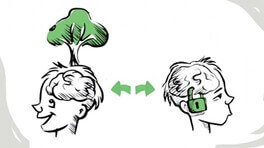Refresher training Management – Incompany
Have you previously followed training in the field of management and do you want to gain the skills...
This slogan was not created by the author of this blog, but is one of the many slogans that appear when you enter the term Mindset on Google. “Keep going. You didn't come this far just to come this far”, is another one that all aims to get employees/fellow employees into a positive mindset. And let's be honest, that can't hurt, in these special times, to say the least.

Mindset, there is actually no good Dutch word for it, translated it means 'conviction', but not quite a translation that covers it all. In psychology, it stands for the way employees think about themselves and in particular about their intelligence and qualities. Yet in everyday life you see that the term is used in a different way. “The mindset of my team is far too negative,” a manager complained to me not so long ago. To continue with: “If it were more positive, we would still easily achieve our objectives.” In short, MINDSET refers to the way one looks at life, and not the way you think about yourself.
What do the mindset as referred to in psychology and in everyday speech have in common?

Perhaps it is a good idea to first consider Carol Dweck's mindset theory. As I stated earlier, Mindset is the English word for 'belief'. It represents the way employees think about themselves and in particular about their intelligence and qualities. A distinction is made between a fixed mindset and a growth mindset.
Employees who think strongly from a fixed mindset believe that their personal characteristics are fixed. You were born with a certain 'amount' of intelligence and qualities and you will have to make do with that for the rest of your life. Employees who think strongly from a growth mindset, on the other hand, believe that they can continue to improve and develop themselves. Your talents are just the starting point; you can continue to grow by working hard and gaining experience.
The fixed mindset
Because employees who think strongly from a fixed mindset feel that their qualities are unchangeable, they find it important that they can often demonstrate that they have a fair amount of innate talent. However, this desire to appear smart or good has a downside. They feel smart when they do something quickly and perfectly. That's why they prefer not to do things that are difficult. When you take on a challenge, the chance that you will make mistakes is very high. And from that fixed mindset, making mistakes is terrible: if you are smart, when everything goes fast and well, you are obviously stupid when you make mistakes!
A second problem is that employees who think strongly from a fixed mindset prefer not to put any effort into anything. For these employees it is clear: either you can do it, or you have to work hard for it. The fact that you have to make an effort for something means to them that you are actually not very good at it. According to them, practice and hard work belong to employees who are not that smart or good. So if you want to come across as a natural talent, don't work hard!
The growth mindset
When you assume that you can always improve, you love challenges. Employees who think strongly with a growth mindset enjoy difficult work because it gives them the feeling that they are developing. Making mistakes is just part of life for these employees: you can learn something from them and you can improve yourself.
Employees who think from a growth mindset will not give up when things go wrong or when something takes a lot of effort. They accept the learning process that comes with growing. They know that they have to work hard to get ahead and are happy to make that effort. In short, a growth mindset leads to a passion for learning. If you want a person to make optimal use of his talents, it is important that he develops a growth mindset.
The good news is: you can change your mindset, and employees can help fellow employees learn or maintain a growth mindset!
What happens now if a country like the Netherlands ends up in a crisis, for example a Corona crisis, and a negative MINDSET arises among many fellow employees.
It is interesting to know that we employees have three brains, namely the reptile brain, the mammalian brain and the human brain, the neo cortex. The structure of your brain can therefore be compared to an apartment complex. It is a process of evolution, where a basic brain first emerged and over time the mammalian brain and human brain were developed on top of or from it. This has come about over millions of years. The final result is our current brain, which is the most young part of the three.
It would go too far to describe the functioning of our brain in detail, but the most important thing is that our reptilian brain is the primitive survival brain on which man's foundation rests. The protection of the body. In addition, it is a brain that is constantly alert. By spotting possible danger, it is able to protect you as a human being as best as possible, to help you get out of a difficult position. It is vital. Especially when you find yourself in a life or death situation. The reaction capacity of this brain is therefore very fast and direct.
However, the Neo-cortex is the part that makes us human, it sets us apart. It makes us what we are. Yet we as humans cannot do without the other parts of the brain. These brain parts are important for our reproduction, survival and empathy with other employees (empathy). It is therefore important to understand that the coherence and necessary balance between the three parts of the brain ensures a balanced and strong person. Every part needs each other. One cannot exist without the other. A good balance is therefore necessary. This can only be obtained through knowledge, open-mindedness, independence, responsibility, will and action. Some people are lucky that this has been imparted through their upbringing, most are less lucky and are consciously/unconsciously separated from actually being and becoming a model child. As a result, they are consciously/unconsciously searching.
So the answer to the question; what happens when a country like the Netherlands ends up in a crisis is that our reptilian brain immediately comes into action and we ask ourselves hundreds of questions; What does this mean for me? Can I still buy food? Can I still pay for my house? Will I keep my job? Won't I get sick and end up in the ICU? Am I going to survive this? All questions with a negative tone and the consequence; The Netherlands ends up in a negative mindset. Not strange, but very annoying, because all we want to do is survive. With very strange consequences; we're all going to buy toilet paper. And this behavior only changes when the first signals of recovery arrive. Until the moment we get the idea that we survive and we are able to use our neo-cortex again.
And then the non-psychological MINDSET comes into play; The companies that are the first to create a positive MINDSET among their employees not only create a positive MINDSET but, above all, opportunities. And then it helps enormously if you have employees who have a growth mindset, who are convinced that if something fails once, they learn from it and do better next time.
Earlier in this blog I talked about the good news; you can change your mindset, and adults can help children learn or maintain a growth mindset! But there is more good news; adults can't just help children change their mindset; adults can also help adults change their mindset. It will not happen overnight, but with good training/coaching and a portion of fighting spirit, great results can be achieved.
And now? Entrepreneurs help employees create a positive mindset and send employees on the job, let them visit customers or at least communicate with them. Teach them to ask customers questions with a positive mindset and let them tell customers that every crisis offers opportunities. This is how you lay the foundation for your success tomorrow.
“You were given this life because you are strong enough to live it.”
Goodluck!